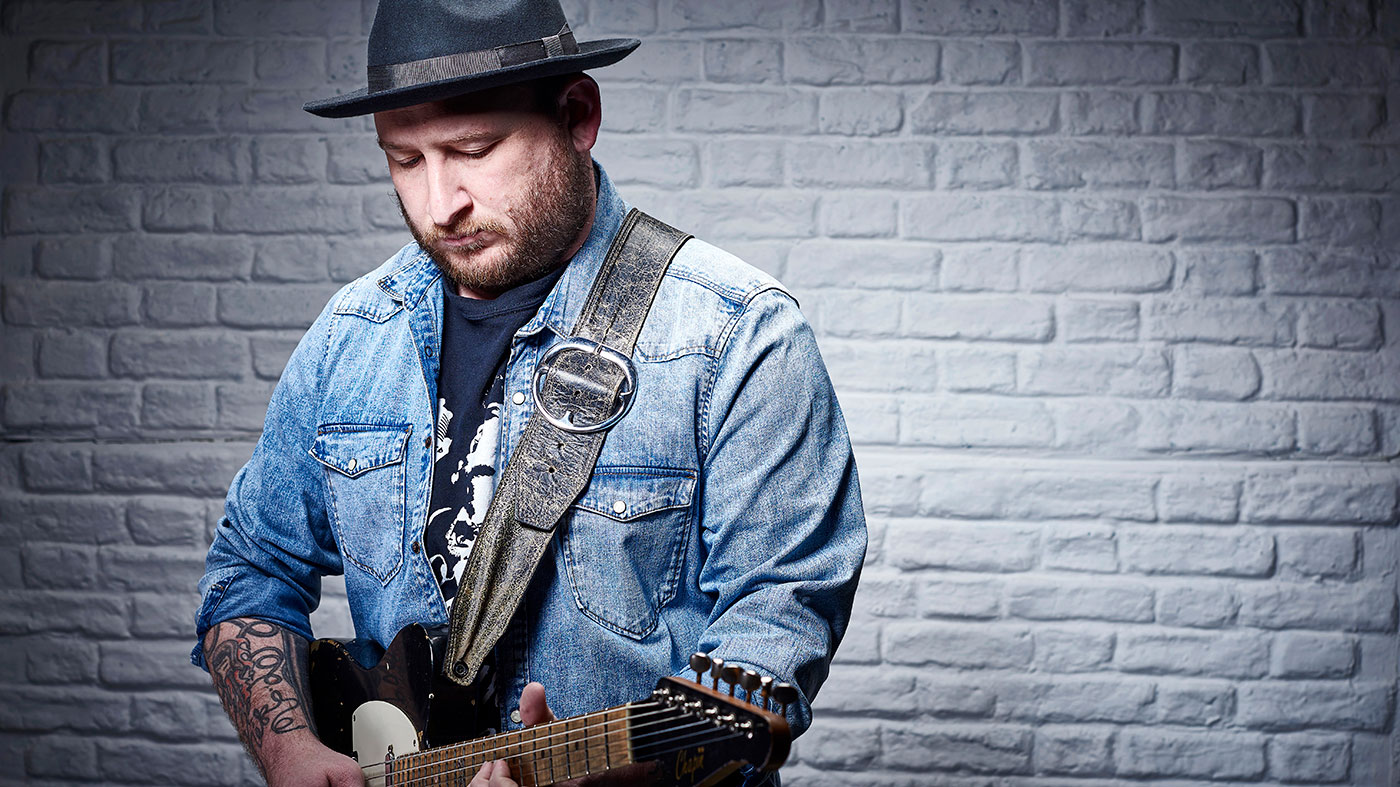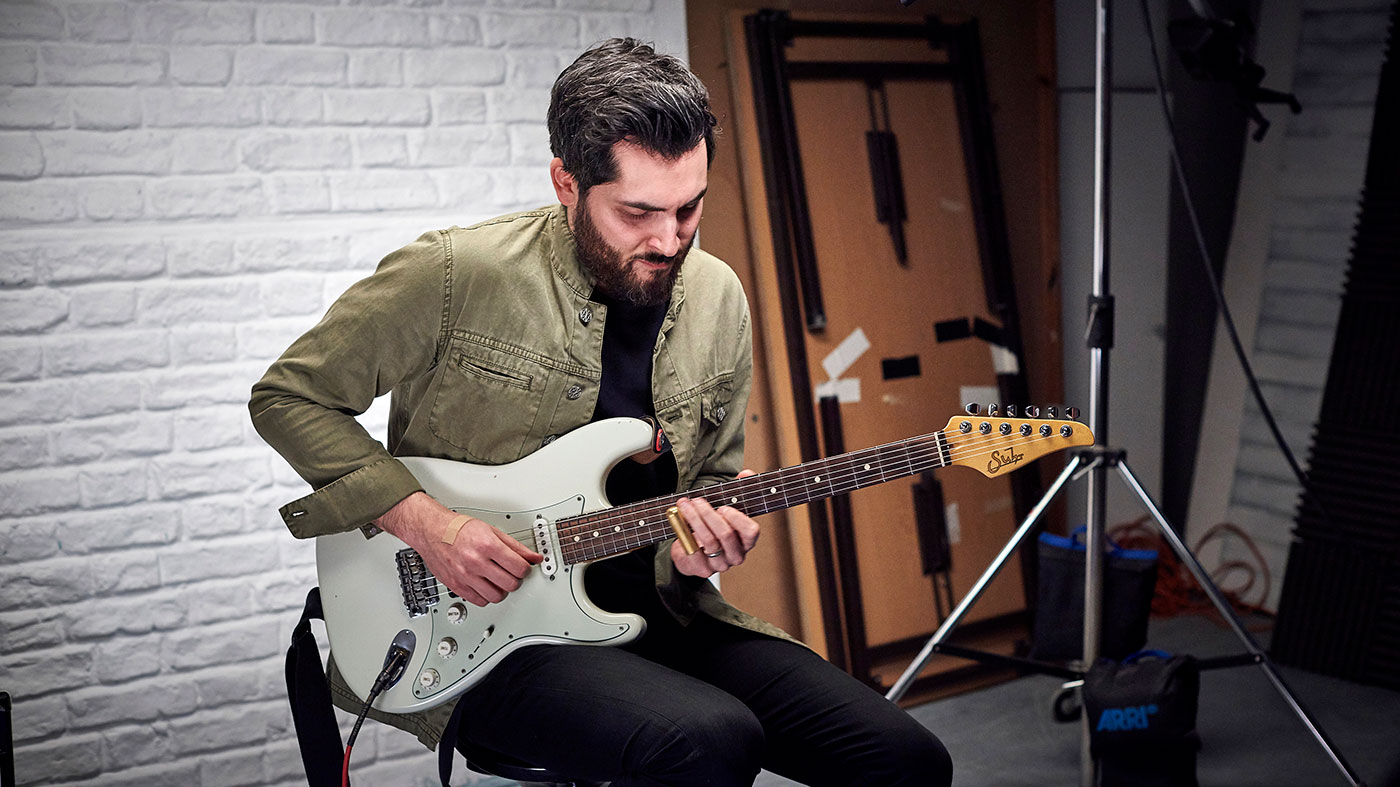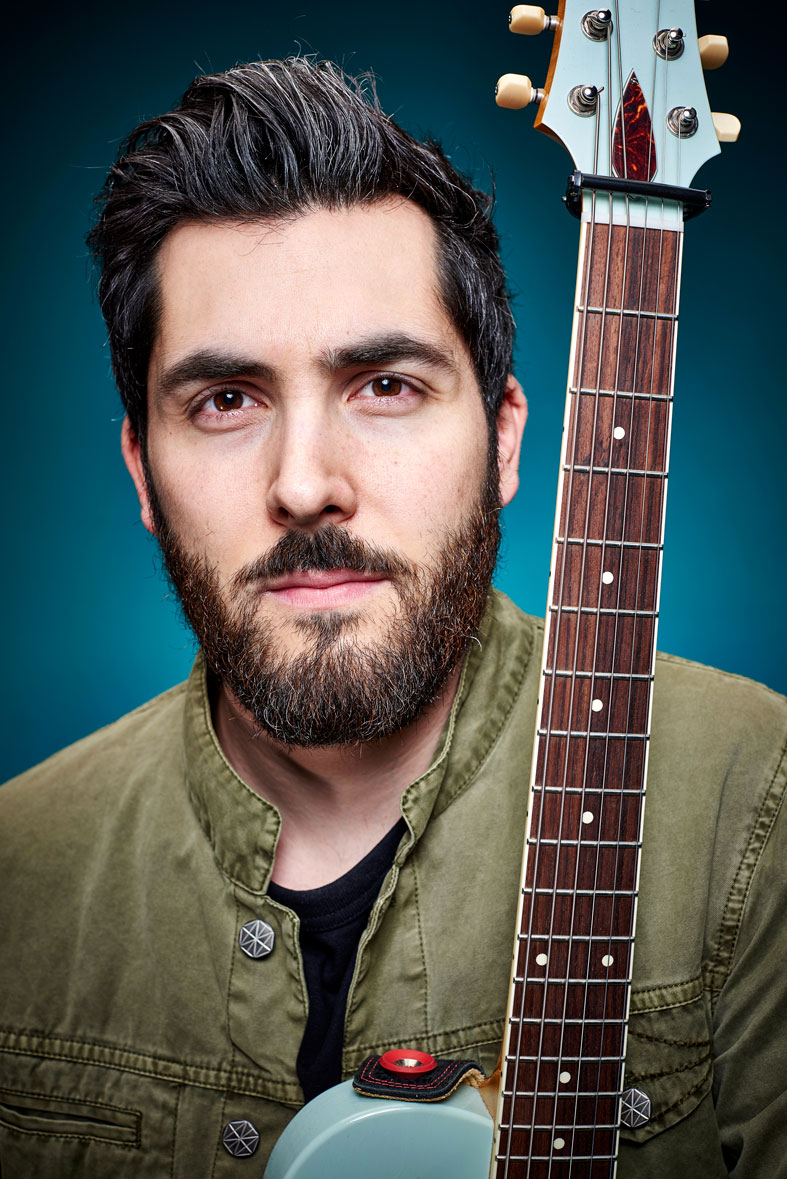Ariel Posen: “People started to take notice once we finally started just playing like ourselves”
Slide, solo material and playing sideman to Bros Landreth

One of Canada’s finest exports, Ariel Posen tells us how he dials in the golden tones of his stunningly expressive slide work - and how to inspire emotion on guitar...
The man responsible for the exceptional slide guitar playing on The Bros Landreth albums is sitting before us now in our studios during a whistle stop from the Josh Smith tour.
He tells us that the journey from the previous night’s gig in Birmingham was interrupted by roadworks, meaning that he barely had time to become acquainted with his hotel room before it was time to head off in our direction in the grey light of dawn. He reveals that the tour has been going very well, with some sold out venues and appreciative audiences all around the country. But he also explains how the double-headed guitar beast that was him and Josh Smith happened almost by accident.

Josh Smith: “I was definitely a Tele guy in denial, my whole life”
“I think I was just chatting with Dudley [Ross, the tour promoter],” he tells us. “He said, ‘Do you want to do the London show with us?’ I said, ‘Absolutely’. Then it turned into, ‘Why don’t you do three or four of the dates around the London show?’ I said, ‘Even better. Absolutely.’ Then he said, ‘You know what, man? We would love to have you for the whole tour.’ I said, ‘I’m there.’”
So it transpired that audiences were treated to a double dip of two guitarists who may not quite be household names - yet, anyway - but are among the most sublimely expressive players we’ve had the pleasure to witness in recent times. But, to start, we have to ask about Ariel’s regular gig with The Bros Landreth. How did that happen?
“Well, we’ve all known each other for the better part of 15 years. We’ve grown up together. Dave and I were in our first band together. Joey’s girlfriend was in my high school band, and that’s how I met him. We’ve all probably backed up hundreds of artists, as side guys. That’s how we’ve made most of our living, travelling around backing other people up and doing that kind of thing.
“Then when the opportunity came around just to play together, and do the band thing, it always feels natural. It’s like the home base, musically. That’s when people started to take notice, once we finally started just playing like ourselves, instead of trying to play other people’s music and do what we thought people would want to hear.”
Want all the hottest music and gear news, reviews, deals, features and more, direct to your inbox? Sign up here.

Serve the servants
Do you think there are lessons you can take from being a sideman that are useful when you switch, as now, to solo work?
“I’ve fronted bands before. I’ve played many shows fronting and singing, I’m no stranger to that. But I am totally new to touring under my own name. I’ve been fortunate to work with a lot of fantastic front people.
As a guitar player sideman, you always learn to serve the song. You have a part, it’s not about you, really
“So, in regard to how to be a frontman, yes, I’ve learnt a lot. Just in terms of trying to engage a crowd, entertaining and connecting with a crowd. Just finding that honesty and sincerity. At the same time, as a guitar player sideman, you always learn to serve the song. You have a part, it’s not about you really.”
Serving the song is an underrated skill in guitar. How do you interpret that?
“Our music definitely has guitar moments, but it’s not about the guitar. The guitar is there to support. There are a lot of moments, and it’s nice, but it takes a back seat. It’s obviously a guitar band, but it’s about the singing and the arrangement. I come from the less is more camp - don’t play all the notes because you can, just play the ones that matter. Those are the ones that stick.
“Don’t get me wrong. I’ve put in almost two decades of listening to music with so many notes, so much guitar, guitar, guitar. But the stuff that moves me the most is the stuff with the least of it. I have some favourites, but I’m always finding new ones, and I’m always searching. Just to be moved. I want to be on a journey, and for me it doesn’t always come from notes.”
It feels like there’s a kind of new language of guitar emerging, which players such as yourself and Josh Smith embody, that draws from every guitar genre from country to jazz yet still sounds very cohesive and natural...
“It’s easy to sound like other people, but it’s hard to find your voice. That’s the number one thing I’m always striving for. I’ve had people compliment me and say, ‘Hey, man. I was sitting in the bar in the venue. I heard one note with a slide and immediately I told my friend, ‘Oh, my God. Ariel is here. Let’s go in...’
“It’s like that’s the biggest compliment you can get. People forget sometimes, especially with guitar because it has such a totemistic thing that goes with it, is it’s about inspiring emotion. That’s what the point of music is. You’re meant to move people, transport them.”

Yes Suhr
What are you playing at the moment, guitar wise?
“What I’ve been playing for the last couple of years is a Suhr Classic Antique with a humbucker, single, single. I’ve always loved Strats, you can’t go wrong with them. Then I’ve been playing a Collings SoCo Deluxe. The most monogamous I’ve ever been with a guitar is a 335, which I love, and I still love.
“My friend Mark from Collings said ‘I know you like that guitar. Have this. I think you will really like this.’ Sure enough, I did. It’s lovely. Since then my main guitar… I use the Suhr, and I use the Collings. It’s a 360 LTM. I have that tuned to open C.”
Why have you landed up with them, as opposed to, say, Fender and Gibson?
I’ve always admired Suhr. I played a couple and I liked how they looked, I liked how they felt
“You know what? I’ve always admired Suhr, and I remember seeing Mike Landau playing one on YouTube all the time. I played a couple and I liked how they looked, I liked how they felt. When the opportunity came to work with those guys I was just over the moon. I really do enjoy the guitar.
“With Collings it’s funny, because I got introduced to them only with their acoustics. I was playing a festival in Georgia nine years ago, and I saw the mandolin and the acoustic. I’m very much into bluegrass, and traditional stuff, and folk as well. And I have a Martin D-28, I’ve gone through a couple. It was like, ‘Oh, my God. This is amazing’. So that’s where I first heard of it. Then I found out they do electrics, and I was like, ‘Wow, these are spectacular.’”
Are you much of a pedal guy?
“Very much so, yes. I will usually have at least one overdrive on always, and I will maybe put one thing on top of that. I really use my volume knob as a tool, and I play loud as hell, and I manage to really get some nice sustain that way. Heavier strings really help for that. Higher action really helps for that. The same stuff applies for not playing slide. It’s all the same stuff.”
What are your go-to pedals right now?
“Well, I could tell you the ones I’ve been enjoying as of late. It’s always kind of changing! I really enjoy the Mythos Daedalus by my friend Zach Broyles in Nashville. We might be cooking something up a little interesting in the next coming weeks. Some of my favourites… The King of Tone is a mainstay on my big board. The Vemuram Jan Ray. I’m currently enjoying the Hudson Broadcast.
“Some other new ones I’m really enjoying are the Beetronics Octahive, which is the Octavia and the Overhive. The Greer Lightspeed is amazing, the Thorpy stuff is amazing. I grew up with a Tube Screamer, then I totally realised that that’s not really my sound. Jesse Davey of King Tone does some amazing stuff. I’ve been using his fuzz - fuzz is a big part of my sound.”

Keep your head
People can be put off fuzz for life, because it can be tricky to dial in. How do you like to set up your fuzz to get an expressive sound that isn’t too sizzly or synthetic?
“I’ve been experimenting lately. I’ve been turning everything off and only having the fuzz on. As opposed to just stacking it. Some pedals need to stack, and I find that they just really come to life when I do that, and some don’t. And so many of them are dynamic.
“I’ve recently figured out that I think I prefer silicon fuzz pedals, and I have a lot of germanium stuff. Every time I’ve told people that they’re kind of like, ‘Huh?’ It’s smoother to me. I love a fuzz pedal where you can turn your guitar knob down to six or seven and you’re perfectly clean. Straight up clean. That one [by King Tone], and the Veteran by Thorpy, is.”
Amp wise, are you a Fender guy?
I love headroom, and I need headroom. My playing suffers and I don’t play like myself if I start topping out too soon
“Absolutely. I’ve always been a Fender guy. I’ve tried every fancy amp and then I always end up just going back to a Deluxe or something. I do enjoy vintage amps, but they’re just not reliable on the road. So I stopped taking my ’64 Deluxe Reverb on the road. I have a Gibson GA-18 that I don’t take out anywhere on the road anymore, but it sounds amazing. In the studio, they’re great.
“My main gigging amps at the moment are my Two-Rock Traditional Clean and my Benson Chimera, which is a 30 watt, very clean, a lot of headroom. I love headroom, and I need headroom. My playing suffers and I don’t play like myself if I start topping out too soon.
“I got to try that Two-Rock Traditional Clean. I visited those guys back in August. They knew I was coming. I walked in, and they go, ‘We have this prototype for you’. Bill was there, he just literally had it ready, not even in a box yet. I was like, ‘Okay…’ I tried the Traditional Clean first, and I was like, ‘Oh, my God.’
“I was just playing my Suhr and it sounded the most gigantic, clean, lush thing I’ve ever tried. Then I tried the Classic Reverb, and it was like… amazing amp. That’s what we’re using on this tour as well. For me, it didn’t compare. What I’m looking for, I think I just wanted a pedal platform: clean, glassy, beautiful.”
What can we expect from your forthcoming solo material and when are we going to hear it?
“I don’t want to put a date on it, of course, but I’m hoping by the middle part of this year. I need to get the ball rolling to finish it ASAP. Definitely this year. What you can expect is I come from a band in which there’s a lot of singing, a lot of harmony, there are some guitar moments… It’s like that rootsy Americana, if you will, but not really Americana.
“It’s like taking a page out of there, because that’s what I know and that’s what I come from. If you like The Bros Landreth hopefully you will like this, but it’s kind of my own thing as well. There are a bit more R&B influences at times, but there’s just as much slide and non-slide.”

